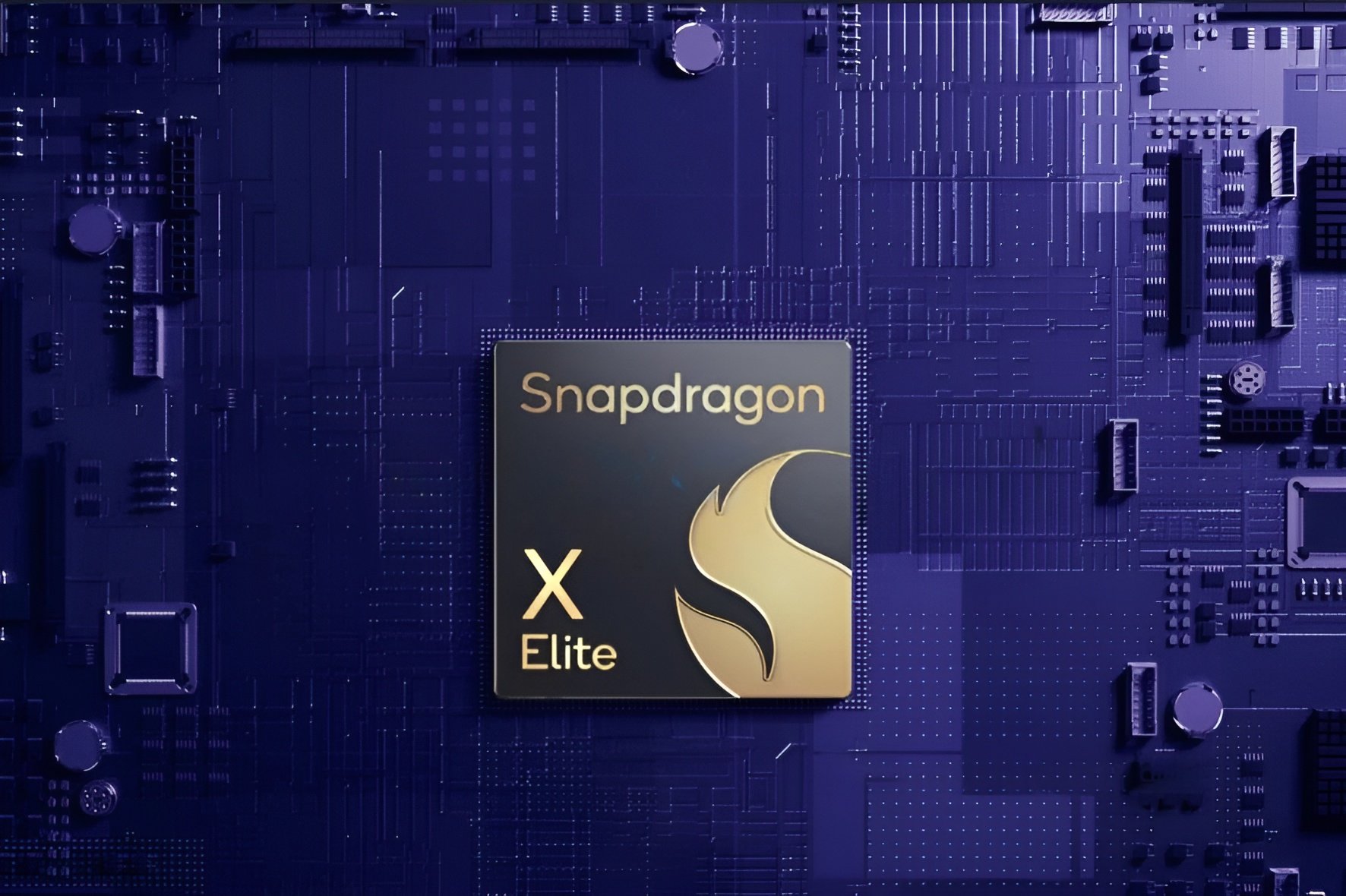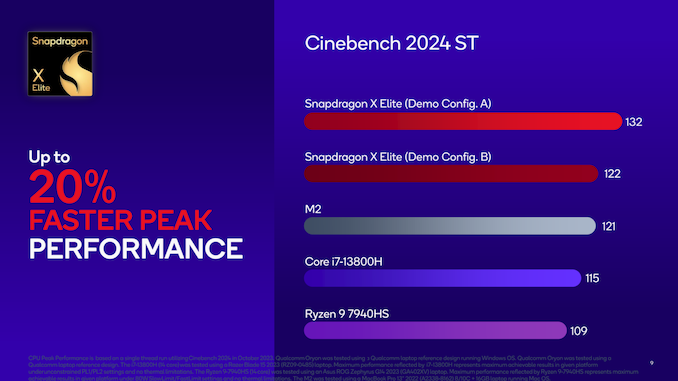Qualcomm’s Snapdragon X Elite Laptop Processor Makes its Performance Debut

Qualcomm has released additional benchmarks of the Oryon core architecture-based Snapdragon X Elite CPU. After the original announcement and benchmarks, Qualcomm provided a more in-depth look at the next-generation Snapdragon X Elite CPU platforms that would power its upcoming line of Windows PCs.
Qualcomm provided two reference laptops for viewers to use during the hand-off presentation; one was a 28W efficiency-focused model, and the other was an 80W high-performance variation. The performance-oriented system used the Snapdragon X Elite CPU at a clock of 4.3 GHz (2-Core) and 3.8 GHz (All-Core) boost, while the thin and light configuration used a clock of 4.0 GHz (2-Core) and 3.4 GHz (All-Core).
- Laptop #1 – Snapdragon X Elite CPU 80W / 4.3-3.8 GHz Boost / 16.5″ Display / LPDDR5x-8533
- Laptop #2 – Snapdragon X Elite CPU 28W / 4.0-3.4 GHz Boost / 14.5″ Display / LPDDR5x-8533
The 80W configuration of the standard laptop has a 16.5″ screen with a maximum resolution of 3840×2160 and a larger 87Wh battery than the 28W configuration, which has a 14.5″ OLED screen with a maximum resolution of 2880×1800. The most recent LPDDR5x-8533 system memory and active cooling were standard on both versions. As its name suggests, the slimmer laptop was only 15mm wide, while the 80W variant measured in at 16.8mm.

Cinebench 2024, Geekbench 6, 3DMark Wildlife Extreme, Aztec Ruins, and UL Procyon AI were only few of the benchmarks used to compare the two CPUs’ performance. The Qualcomm Snapdragon X Elite series’ 28W and 80W CPU variations were compared to a variety of CPUs from Apple, Intel, and AMD. Using unrestricted power limits, the competitor results are at their peak performance.
Platforms included:
- Intel – Core i7-13800H (14-Core CPU @115W) Razer Blade 15 2023
- AMD – Ryzen 9 7940HS (8-Core APU @80W) ROG Zephtrus G14 2023
- Apple – M2 (8/10C) MacBook Pro 13″ 2022
Benchmark Scores
| Qualcomm Snapdragon X Elite Benchmark Scores | ||||
| High Perf – Observed | High Perf – QC Expected Range | Thin and Light – Observed | Thin and Light – QC Expected Range | |
| Cinebench 2024 ST | 132 | 131-132 | 124 | 122-123 |
| Cinebench 2024 MT | 1227 | 1211-1233 | 997 | 925-973 |
| Geekbench 6.2 ST | 2971 | 2939-2979 | 2780 | 2722-2798 |
| Geekbench 6.2 MT | 15371 | 15087-15382 | 14029 | 13849-14007 |
| Linux: Geekbench 6.2 ST* | 3236 | N/A | N/A | N/A |
| Linux: Geekbench 6.2 MT* | 17387 | N/A | N/A | N/A |
| PCMark 10 Applications | 13498 | 12869-13112 | 12737 | 12433-13516 |
| GFXBench Aztec Ruins – Normal | 354 fps | 355-357 fps | 294 fps | 294-296 fps |
| 3DMark Wildlife Extreme | 45 fps | 44.65-44.78 fps | 39 fps | 39.0-39.2 fps |
| UL Procyon AI* | 1766 | 1750-1800 | 1813 | 1750-1800 |
The Snapdragon X Elite CPU, with its own Oryon core architecture, is rumoured to be 20% more powerful than rivals in single-core performance and twice as fast in multi-threaded performance in Cinebench 2024. Compared to the Apple M2, the i7-13800H, and the Ryzen 9 7940HS, the 80W chip is 9 percent faster, the i7-13900H is 15 percent faster, and the 28W X Elite CPU is 12 percent faster.
The X Elite 80W laptop is over twice as fast as Apple’s M2 processor, which is 25% quicker than Intel, 25% faster than AMD, and 28% faster than the 28W chip. Similarly, the 28W setup is 66% faster than the Apple M2 and on par with even more power-hungry Apple and Intel alternatives.
Up to 10% faster in single-core tests and up to 50% faster in multi-core testing can be observed with Geekbench. The two X Elite CPUs are tied for best single-core performance among the tested chips, although they diverge significantly in multi-core benchmarks. When compared to Apple’s, AMD’s, Intel’s, and the 28W X Elite chip’s respective power consumptions, the 80W setup is up to 5% faster.
Qualcomm X Elite central processing units (CPUs) with Oryon cores are scheduled for release in the middle of 2024, and further information will be made available in the near future. By the time these processors debut, both Intel’s Meteor Lake (1st Gen Core Ultra) and AMD’s Strix Point (Ryzen 8000) CPUs will be available, making for intense competition.
Source: AnandTech





